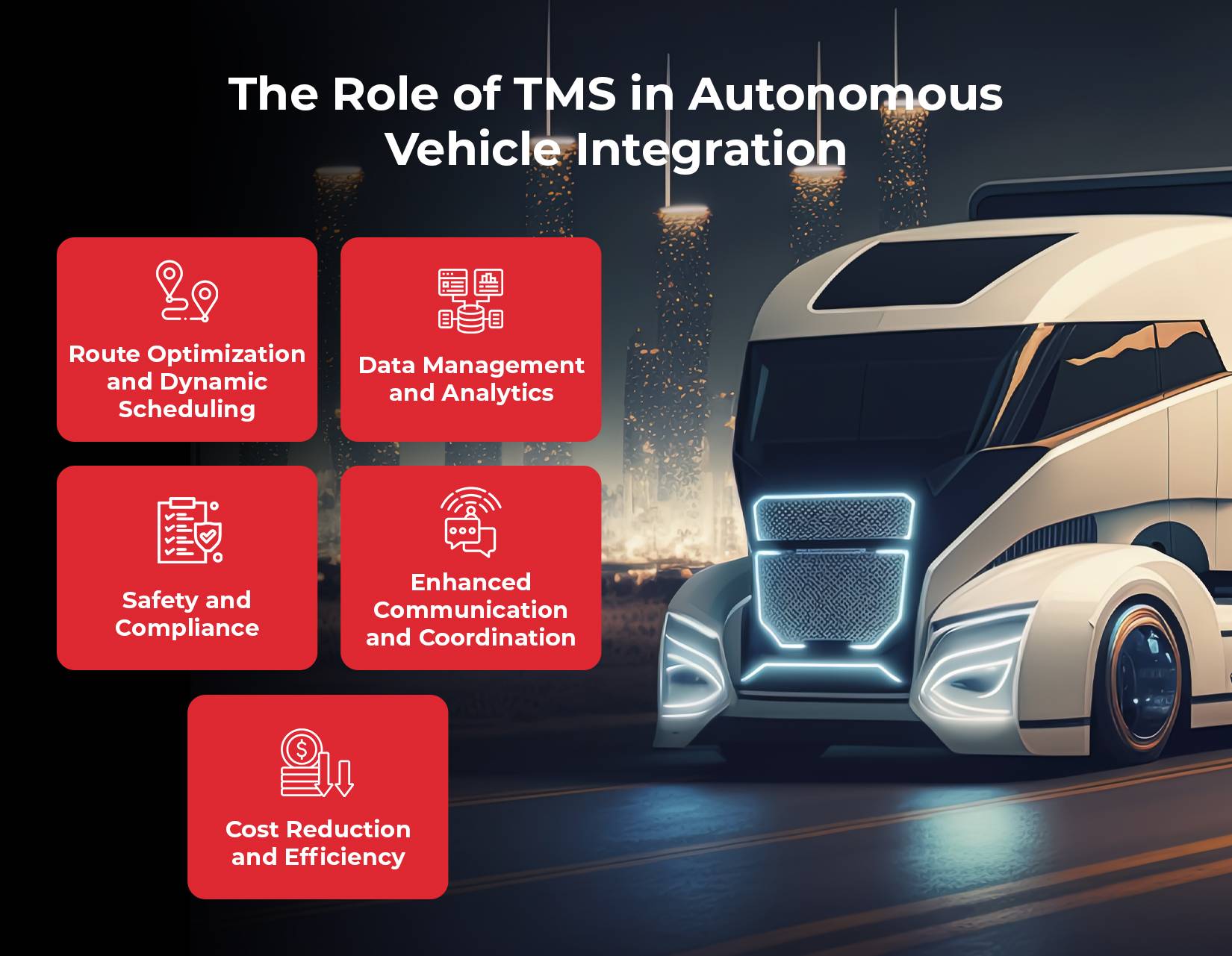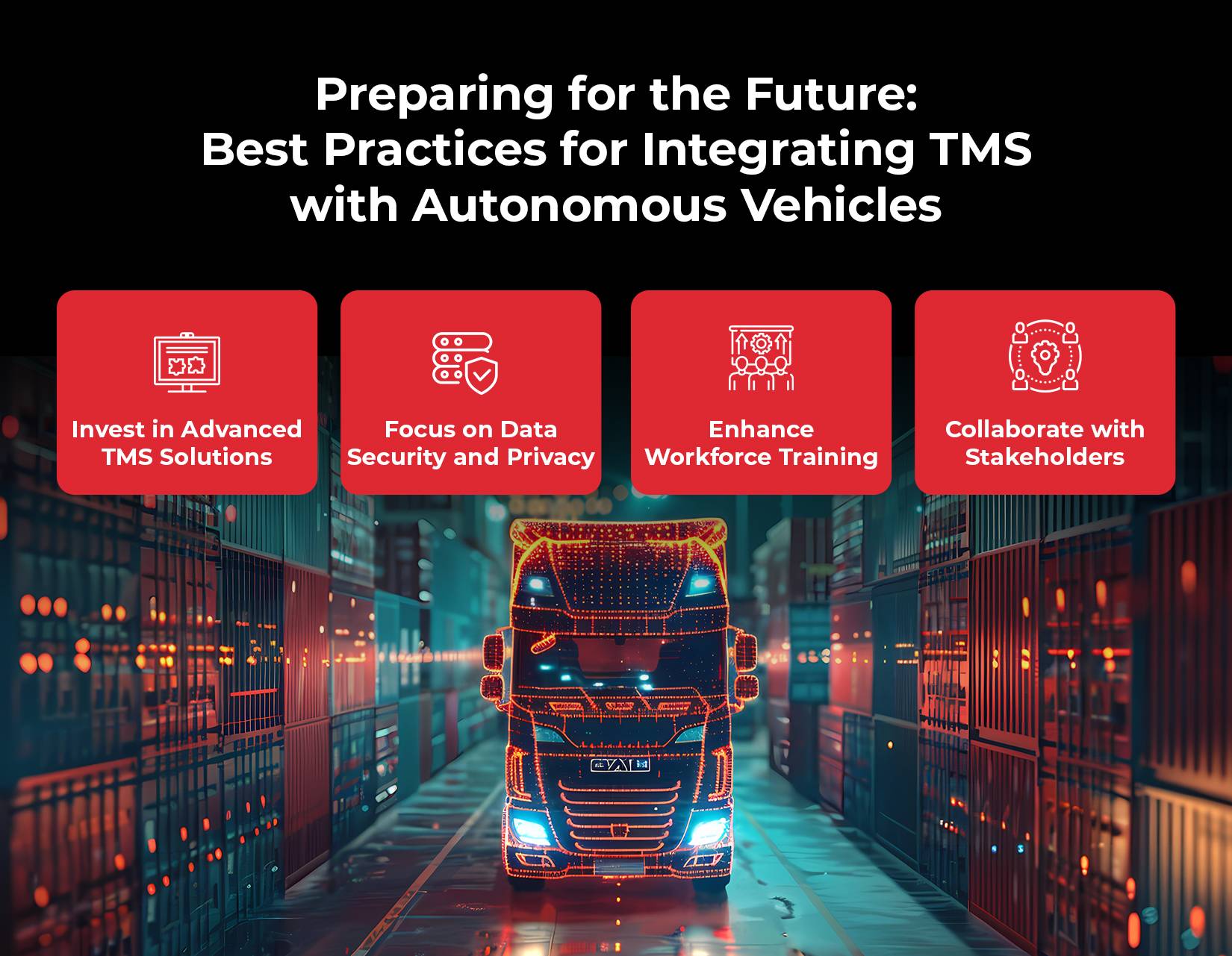
The Role of TMS in Autonomous Vehicle Integration: Preparing for the Future of Transportation
As the transportation industry evolves, the integration of autonomous vehicles (AVs) presents both opportunities and challenges. One of the critical tools enabling this transition is the Transportation Management System (TMS). This blog will explore the pivotal role of TMS in the integration of autonomous vehicles, preparing the logistics and transportation sector for a future where AVs are central to operations.
Understanding Transportation Management Systems (TMS)
A Transportation Management System (TMS) is a digital platform that helps businesses plan, implement, and refine the movement of goods. It streamlines the end-to-end transport processes, from order management to route planning and freight payment. The best transportation management software solution provides visibility into everyday operations, facilitates better decision-making, and enhances customer service.
TMS solutions are already transforming the logistics industry by improving efficiency, reducing costs, and providing real-time insights into transportation networks. However, as we move towards integrating autonomous vehicles into the supply chain, TMS will play an even more critical role.
The Role of Transportation Management System (TMS) in Autonomous Vehicle Integration

1. Route Optimization and Dynamic Scheduling:
Autonomous vehicles rely heavily on precise route planning and real-time adjustments to navigate efficiently. A TMS can offer advanced route optimization algorithms, ensuring that AVs choose the safest and most efficient routes. The best transport management software uses data analytics and machine learning to adapt to changing traffic conditions, weather, and road closures, providing a critical capability for AVs that operate without human intervention.
2. Data Management and Analytics:
Autonomous vehicles generate vast amounts of data, from sensor readings to real-time location tracking. Managing and making sense of this data requires robust data management systems. A TMS integrates with AVs to collect, store, and analyze data, enabling organizations to monitor performance, predict maintenance needs, and improve operational efficiency. With the best transportation management software, companies can leverage this data to gain insights into fleet performance and optimize routes and schedules.
3. Safety and Compliance:
Safety is a significant concern in the integration of autonomous vehicles. A TMS ensures that AVs comply with local, national, and international safety regulations. It monitors vehicle performance and sends alerts if any system malfunctions or deviations from safety standards occur. The best transport management software also keeps track of regulatory changes, helping companies stay compliant and avoid fines and legal issues.
4. Enhanced Communication and Coordination:
In a fleet with both autonomous and human-driven vehicles, effective communication is crucial. A TMS facilitates seamless communication between AVs and other vehicles in the fleet, ensuring coordinated movement and reducing the risk of accidents. The system can also communicate with traffic management systems, further enhancing safety and efficiency. The integration of TMS with AVs provides a unified platform for managing all aspects of transportation, from dispatch to delivery.
5. Cost Reduction and Efficiency:
Autonomous vehicles promise to reduce operational costs by minimizing fuel consumption, optimizing routes, and eliminating the need for driver wages. However, achieving these benefits requires a sophisticated TMS that can manage and optimize these variables. The best transportation management software enables companies to maximize the cost benefits of AVs by optimizing fuel efficiency, reducing idle time, and minimizing the need for costly manual interventions.
Preparing for the Future: Best Practices for Integrating TMS with Autonomous Vehicles

As companies prepare for the integration of autonomous vehicles, they need to consider several best practices to ensure a smooth transition. Here are a few steps businesses can take:
1. Invest in Advanced TMS Solutions:
To fully capitalize on the benefits of autonomous vehicles, companies need to invest in the best transportation management software that offers advanced features like AI-powered route optimization, real-time analytics, and dynamic scheduling. These capabilities are essential for managing AVs and ensuring their smooth operation.
2. Focus on Data Security and Privacy:
With the increased reliance on data, security, and privacy become paramount. Companies should ensure their TMS has robust security measures to protect sensitive information generated by autonomous vehicles. This includes encryption, access controls, and regular security audits.
3. Enhance Workforce Training:
The integration of AVs will change the nature of work in the transportation sector. Companies need to train their workforce to operate alongside autonomous vehicles, understand the new TMS functionalities, and manage any issues that arise. Investing in training ensures a smooth transition and minimizes operational disruptions.
4. Collaborate with Stakeholders:
Successful integration requires collaboration with multiple stakeholders, including technology providers, regulatory bodies, and logistics partners. Engaging with these stakeholders early on can help companies navigate the complex landscape of AV integration and ensure that their TMS is aligned with industry standards and regulations.
The Future of Transportation: A Blend of TMS and Autonomous Vehicles
The future of transportation is rapidly evolving, with autonomous vehicles set to revolutionize the industry. A robust Transportation Management System will be crucial for companies looking to integrate AVs into their operations successfully. By leveraging the best transport management software, organizations can ensure seamless integration, optimize operations, and stay ahead in an increasingly competitive market.
According to a report by MarketsandMarkets, the global autonomous vehicles market is projected to grow from USD 54.23 billion in 2019 to USD 556.67 billion by 2026, at a CAGR of 39.47% . This growth presents a significant opportunity for companies that are ready to embrace AV technology and integrate it with a TMS.
Conclusion
As the transportation industry moves towards a future dominated by autonomous vehicles, a comprehensive Transportation Management System will be vital. The best transportation management software will not only facilitate the integration of AVs but also enhance efficiency, reduce costs, and ensure compliance with safety regulations. Companies that invest in LogiNext Mile’s advanced TMS solutions today will be well-positioned to lead the industry into the future, leveraging the benefits of autonomous vehicle technology to gain a competitive edge. Click on the red button and book a demo with us.
123







@LogiNext